- Home
- Brian Garfield
Line of Succession Page 2
Line of Succession Read online
Page 2
“I doubt it. Not unless you find tissues adhering to the pliers. We could set up a circumstantial case on the basis of blood type, I suppose.”
“Yeah. All right. Look, anything else you didn’t put in the report? Anything that might give a lead?”
“Up in New York and Chicago they seem to have quite a few mobster killings where they rub out somebody who squealed on them and leave the corpse lying around with a big plaster of tape over the mouth, or they pour a jar of acid in the mouth, that kind of thing. It’s a warning to other potential squealers—you know, see what happens to you if you open your mouth to the wrong people.”
“Sicilian justice.”
“Yes. But this girl wasn’t Sicilian, that’s for sure.”
“Maybe the killer is.”
“Maybe.”
The lieutenant sighed audibly. “With pliers and a hammer and chisel? I don’t know.”
“I’d like to help, Lieutenant. I’d love to put it all in your lap for you. But I’m all gone dry.”
“All right. I’m sorry I bugged you, Doc. Good night.”
3:05 A.M. The make on the dead girl came into the detective squad room on the wire from the FBI fingerprint files and the sergeant ripped it off the machine and took it to the lieutenant’s desk in the corner. The lieutenant read halfway into it and went back to the beginning and started again.
“A Federal snoop.”
“From Justice.”
“It’s an FSS number. She was Secret Service.” The lieutenant sat back and spent ten seconds grinding his knuckles into his eye sockets. He lowered his hands into his lap and kept his eyes shut. “Cripes. I was starting to get a picture.”
“What picture?”
“I had it worked out. She was a hooker and she rolled some capo from the Mob, not knowing who he was. So the capo sent some of his boys out to take care of her. But this blows it all to hell.”
The sergeant said, “Maybe we’d better call Justice.”
3:40 A.M. A telephone was ringing, disturbing David Lime’s sleep. He listened to it ring. He had never fallen victim to the compulsion to answer every telephone that rang within earshot; anyhow this was not his own bed, not his own bedroom, not his own telephone; but it disturbed his sleep.
He lay on his back and listened to it ring and finally the mattress gave a little heave and a soft buttock banged into his leg. There was a clumsy rattle of receiver against cradle and then Bev said in the dark, “Who the hell is this? … Shit, all right, hold on.” Then she was poking him in the ribs. “David?”
He sat up on his elbow and took the phone from her. “Uh?”
“Mr. Lime? Chad Hill. I’m damned sorry to have to ——”
“The hell time’s it?”
“About a quarter to four, sir.”
“A quarter to four,” David Lime said disagreeably. “Is that a fact.”
“Yes, sir. I——”
“You called me to tell me it’s a quarter to four.”
“Sir, I wouldn’t have called if it wasn’t important.”
“How’d you know where to find me?” He knew Hill had something to tell him but first he had to clear the sleep from his head.
“Mr. DeFord gave me the number, sir.”
Bev was getting out of bed, storming into the bathroom. Lime dragged a hand down his jaw. “Bless Mr. DeFord. Bless the little son of a bitch.” The bathroom door closed—not quite a slam. A ribbon of light appeared beneath it.
“Sir, one of our agents has been murdered.”
Lime closed his eyes: a grimace. Not Smith’s dead. Not Jones has been killed. No. “One of our agents has been murdered.” Like a fourteen-year-old imitating Reed Hadley’s narration for a Grade B Warner’s picture: a mausoleum tone, One of our aircraft is missing! From what plastic packaging factory did they obtain these kids?
“All right, Chad. One of our agents is missing. Now——”
“Not missing, sir. Murdered. I’m down here at——”
“What agent has been murdered?”
“Barbara Norris, sir. The police called the office and I was on night duty. I called Mr. DeFord and he said I’d better get in touch with you.”
“Yes, I imagine he did.” Grandon Pass-the-Buck DeFord. Lime sat up, squeezed his eyes shut and popped them open. “All right. Where are you now and what’s happened?”
“I’m at police headquarters, sir. Suppose I put Lieutenant Ainsworth on, he can explain what they’ve got.”
A new voice came on the line: “Mr. Lime?”
“That’s right.”
“Ed Ainsworth. Detective Lieutenant down here. We had a DOA tonight, a young black girl. The FBI identifies her as Barbara Norris and they gave us an FSS service number for her so I called your office. You’re in charge of her section, is that right?”
“I’m the Deputy Assistant Director.” He managed to say it with a straight face. “DeFord’s the Assistant Director in charge of Protective Intelligence.”
“Uh-huh. Well Mr. DeFord said she was your agent. Do you want the details by phone or would you like to come down and see for yourself? I’m afraid they made a mess of her.”
“Definitely a homicide, then?”
“You could say that. They ripped out her tongue with a pair of pliers and they dug out her heart with a hammer and chisel.”
The door opened and Bev walked naked across the room, sat down in the chair and lit a cigarette and blew smoke at the match. She didn’t look at him: she stared at the floor.
Lime said, “Sweet Jesus.”
“Yes, sir. It was pretty God damned vicious.”
“Where did this happen, Lieutenant?”
“An alley off Euclid. Near Fourteenth Street.”
“What time?”
“About six hours ago.”
“What have you got?”
“Next to nothing, I’m afraid. No handbag, no visible evidence except the body itself. No evidence of sexual molestation. We found a junkie searching the body but he claims he found her that way and the evidence supports his story. I’ve had people combing the neighborhood but you know the way things are in those parts of town—nobody saw anything, nobody heard anything.”
“Any possibility she was killed somewhere else and dumped there?”
“Not likely. Too much blood in the alley.”
Bev stood up and padded to the bed. She handed him a freshly lighted cigarette and an ashtray and went back to her chair. Lime dragged suicidally on the cigarette. Choked, coughed, recovered, and said, “Do you need me down there to identify her? I seem to recall she had no next of kin.”
“Mr. Hill here gave us a positive identification on her. It won’t be necessary. But if you can give us a lead—if I knew what she’d been working on.…”
Lime ducked it: “She was on a security case—I can’t give it to you. But if we come across evidence that might help in a criminal prosecution we’ll pass it on to you.”
“Sure, that’s okay.” A voice of resignation: the lieutenant had known the answer before he’d asked the question. But you had to go through the motions. Everybody has to go through the motions, Lime thought.
“Tell Chad Hill I’ll be in the office as soon as I get dressed.”
“I will. Goodbye, sir.”
Lime rolled over on his side to cradle the phone. Light in the room was weak, splashing in through the open door of the bathroom. He thought about the dead girl and tried to remember her alive; he smashed out the cigarette and climbed off the bed.
Bev said, “I don’t know about the other guy. But your end of that conversation was right out of a rerun of Dragnet.”
“Somebody got killed.”
“I gathered.” Her soft contralto was deepened by the hour and the cigarette. “Anyone I know? Knew?”
“No.”
“Now you’re being strong and silent.”
“Just silent,” he said, and climbed into his drawers. He sat down to pull on his socks.
She got back into be
d and pulled the sheet and blanket up over her. “It’s funny. No two men get dressed in the same order. My ex used to start from the top down. Undershirt, shirt, tie, then his shorts and pants and socks and shoes. And I knew a guy who refused to buy tight slacks because he always put his shoes on first and couldn’t get them through leg-huggers.”
“Is that right.” He went into the bathroom and washed his face with cold water. Used her toothbrush and glanced at the lady-electric shaver on the shelf, but decided against it; he had a shaver in the office. In the mirror there were bags pendant under his eyes. I can’t possibly be as old as I look. He looked like a big sleepy blond Wisconsin Swede gone over the hill and a little seedy. A little bit of office paunch, a fishbelly whiteness about the upper chest and arms. He needed a couple of weeks on a beach in the Virgin Islands.
He gargled mouthwash and went out into the bedroom and reached for his shirt.
Bev looked as if she had gone back to sleep but then her eyes drifted open. “I thought you’d got yourself out of the dagger end of things and confined yourself to cloaks.”
“I have. All I do is keep the papers moving.”
“I see. You send girls out to get killed for you.”
He cinched up his trousers and reached for his tie. Bev sat up, making a face, the good breasts lying a bit askew. “You’d better have a bite of breakfast, I suppose. It wouldn’t do to go ogling corpses on an empty stomach.”
“I could do with toast and coffee.”
She wasn’t tall but she stood tall: a straight-up girl with long legs and high firm hips and a fair amount of mischief in her face. Playful, tawny, good-tempered.
She was the woman he would love if he could love.
She went out to the kitchenette, belting a terrycloth robe around her. She wanted to be useful to him: it was part of her character to be useful; she was a widower’s daughter.
He got into his hairy brown sports jacket and his cordovan loafers and went into the kitchenette after her. Kissed the back of her neck: “Thanks.”
10:35 A.M. Continental European Time There was a knock at the door and Clifford Fairlie looked up from his newspaper. His eyes took a moment to focus on the room—as if he had forgotten where he was. The sitting room of the suite was quite grand in its fin-de-sieècle elegance: the Queen Annes, the Cézannes, the Boulle desk, the expanse of Persian carpet to the heavy double doors. It was a suite to which President-elect Fairlie had admitted few reporters because he had found that most journalists detested any politician who seemed to know the century in which the furniture around him had been crafted.
Knuckles again; Fairlie shambled to the door. He was a man who opened his own doors.
It was his chief aide, Liam McNeely, slim in a Dunhill suit. Behind him the Secret Service men in the anteroom looked up, nodded, and looked away. McNeely came in and pushed the door shut behind him. “Morning, Mr. President.”
“Not quite yet.”
“I’m practicing.”
The smell of expensive aftershave had come into the room with McNeely. Clifford Fairlie settled on the Queen Anne couch and waved him toward a chair. McNeely collapsed as if boneless: sat on the back of his neck, long legs crossed like grasshopper limbs. “Lots of weather we’re having.”
“I spent a winter in Paris once, a long time ago. I can’t remember the sun shining once in the five months from October to early March.” That had been the year he’d lost the Senate race for reelection from Pennsylvania. The President had twisted the knife by sending him to Paris as peace-talk negotiator.
McNeely uncrossed his legs with a getting-down-to-business sigh. The notebook came out of his pocket. “It’s about a quarter to eleven now. You’ve got the Common Market people at noon and lunch here in the hotel at one forty-five with Breucher.”
“Plenty of time.”
“Yes sir. I only mentioned it. You don’t want to show up at the meeting in that outfit.”
Fairlie’s jacket had leather patches at the elbows. He smiled. “Maybe I ought to. I’m Brewster’s emissary.”
McNeely laughed at the joke. “Press conference at four. They’ll mainly be asking about the plans for the trip to Spain.”
That was the nub, the trip to Spain. The rest was window dressing. The vital thing was those Spanish bases.
McNeely said, “And they’ll want your reactions to Brewster’s logorrhea last night.”
“What reactions? For Brewster it was damned mild.”
“You going to say that? Pity. It’d be a good chance to get in a few digs.”
“No point being inflammatory. Too much anger in the world already.”
“A lot of it incited by that pisspot Napoleon in the White House.” McNeely had a Yale Ph.D., he had been an Oxford fellow, he had written eight volumes of political analysis, he had served two Administrations—one in the Cabinet—and he persisted in calling the incumbent President of the United States “this flimflam fuehrer” and “the schmuck on Pennsylvania Avenue.”
It was an attitude not without some justice. President Howard Brewster was a man who specialized in answers, not questions; he had the kind of mind to which Why-not-victory? oversimplifications were very attractive. Brewster represented to uncanny perfection that large segment of the populace which still wistfully hoped to win a war that had been lost a long time ago. To quick-minded sophisticates he stood for Neanderthal politics and nineteenth-century simplemindedness. Brewster was a man of emotional outbursts and political solipsism; to all appearances his attitudes had ceased developing at about the time the Allies had won World War II; and in the age of celebrity, when candidates could get elected because they looked good on a horse, Brewster’s total lack of panache made him a genuine anachronism.
But that view of Howard Brewster was incomplete: it did not take into account the fact that Brewster was a man of politics in the same way that a tiger is a creature of the jungle. The pursuit of the Presidency had cost Brewster almost thirty years of party-climbing and fund-raising dinners and bloc-wooing within the Senate in which he had sat for four consecutive terms. Yet the unresponsive Administration of the unresponsive Government, which McNeely deplored with vigorous sarcasms, was not really of Brewster’s making. Howard Brewster was not so much its architect as its inevitable and typical product.
It was no good condemning Brewster out of hand. He had not been the worst President in American history, not by a wide margin, and the election results had shown it: Fairlie hadn’t so much won the election from Brewster as avoided defeat, and by an incredibly small margin: 35,129,484 to 35,088,756. There had been a madness of recounts; Brewster supporters were still crying foul, claiming the Los Angeles machine had delivered to Fairlie the bloc votes of Forest Lawn Cemetery and the Pacific Ocean, but neither election officials nor Brewster’s campaigners had been able to furnish proof of their allegations and as far as Fairlie knew they weren’t true anyhow—the Mayor of Los Angeles wasn’t that fond of him, not by any means.
In the end Fairlie had eked out 296 votes in the Electoral College to Brewster’s 242, carrying the big states by small margins and losing the small states by large margins. Brewster’s support was in the South and in rural America and the confusion of party allegiances had probably cost him the election because he was nominally and loyally a Democrat while his Republican opponent was in fact somewhere to the left of him.
“Deep thoughts, Mr. President?”
McNeely’s voice lifted him from reverie. “God. I simply haven’t had enough sleep. What have we got laid on for tomorrow morning?”
“Admiral James and General Tesworth. From NATO in Naples.”
“Can you move it back to the afternoon somewhere?”
“Hard to do.”
“I’ve got to get some rest.”
“Just hold out a week, Mr. President. You can collapse in the Pyrenees.”
“Liam, I’ve been talked to by too many admirals and generals as it is. I’m not doing a big-stick tour of American military bases.”
“You could afford to touch a few. The right-wing press likes the idea that you’re doing a world tour of leftist capitals to cement relations with Commies and pinkos.”
London. Bonn. Paris. Rome. Madrid. Commies and pinkos? But Fairlie did not laugh. America’s cross to bear was its simple minds: the ones who saw no distinction between England’s socialism and Albania’s Communism.
McNeely said, “Now the L.A. papers are speculating you’re on your way to Madrid to give away the Spanish bases.”
“That’s a pretty good one.” Fairlie made a crooked smile.
“Uh-huh. We could have cleared some of it up, you know. But you’ve insisted we’re not to comment on that to the press.”
“It’s not my place to comment. Not yet. I’m here unofficially.”
“As Hollerin’ Brewster’s goodwill ambassador. Which is really, you know, quite rich.”
There was a point to it. Europe had taken on the aspect of an American sandbox and United States presidential elections had become quadrennial paroxysms of anxiety throughout the Continent. A shift in stance which Washington regarded as minor might well upset the entire equilibrium of Common Market affairs or NATO’s economy or the status of the Russian Mediterranean Fleet vis-à-vis the American Sixth. The idea had come up three weeks ago during the White House state briefings through which Howard Brewster had conducted Fairlie: to reassure “our valiant allies”—it was a Brewster phrase, typically irrelevant and typically outdated—of the continuity and goodwill of the American Government, wouldn’t it be a good idea for Republican President-elect Fairlie to call informally on half a dozen heads of state as the personal representative of Democrat President Brewster?
The idea had the kind of grandiose theatricality one had learned to expect of Howard Brewster. But Fairlie had agreed for his own reasons: he wanted to meet Europe’s heads of state face to face and an informal pre-inaugural series of meetings might find them more relaxed and natural than had some of the hurried Presidential visits to the same capitals earlier. Unburdened by administrative chores Fairlie would have time to get to know them.
But the Spanish upset had exploded against them all. The bloodless pre-Christmas takeover: Perez-Blasco had wrested Spain from Franco’s indecisive successors and Howard Brewster had growled to Fairlie, “God damn, we got a whole new ball game.” Even now the ink was hardly dry on the junta’s proclamations. Perez-Blasco was feeling his way, trying to shore up the first populist government in forty years. Spain was still the key to the Mediterranean, launch pad for the American nuclear structure in Europe—and Perez-Blasco’s spokesmen had sent up trial balloons in the Spanish press: should Madrid nationalize the nuclear bases and evict the Americans? Nothing was settled: no one knew which way Perez-Blasco would jump.

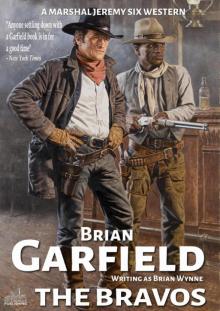 Marshal Jeremy Six #3
Marshal Jeremy Six #3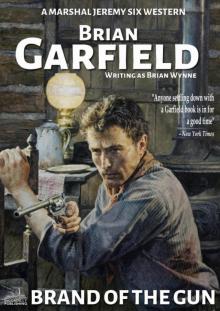 Marshal Jeremy Six #6
Marshal Jeremy Six #6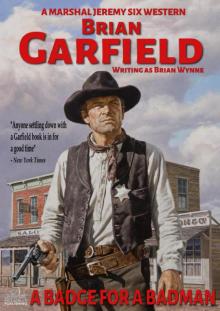 Marshal Jeremy Six #5
Marshal Jeremy Six #5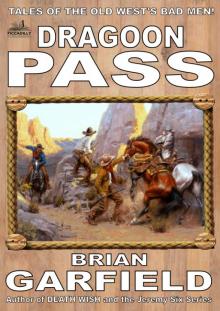 The Outlaws 2
The Outlaws 2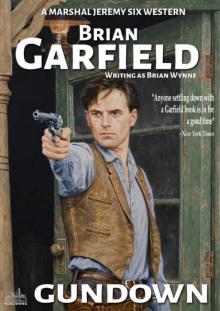 Marshal Jeremy Six #7
Marshal Jeremy Six #7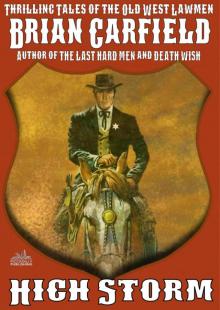 The Lawbringers 4
The Lawbringers 4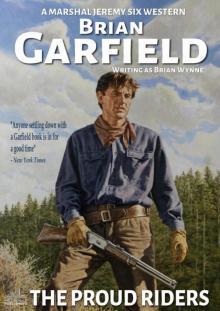 Marshal Jeremy Six #4 the Proud Riders
Marshal Jeremy Six #4 the Proud Riders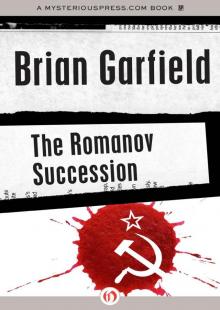 The Romanov succession
The Romanov succession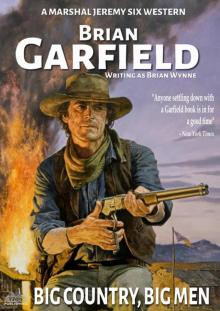 Marshal Jeremy Six #8
Marshal Jeremy Six #8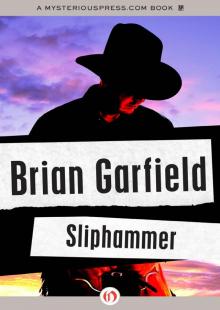 Sliphammer
Sliphammer Line of Succession
Line of Succession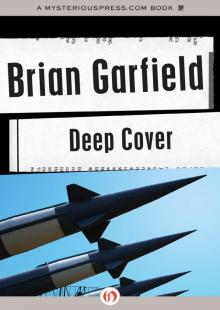 Deep Cover
Deep Cover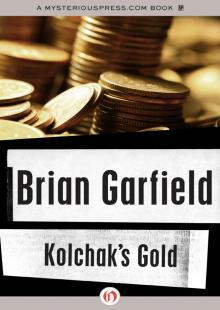 Kolchak's Gold
Kolchak's Gold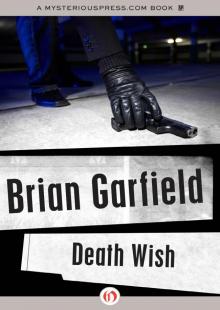 Death Wish
Death Wish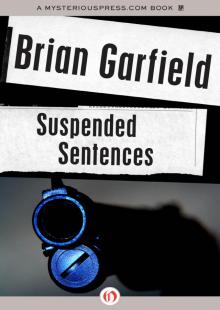 Suspended Sentences
Suspended Sentences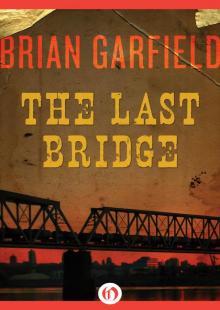 The Last Bridge
The Last Bridge Relentless
Relentless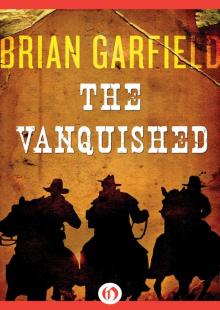 The Vanquished
The Vanquished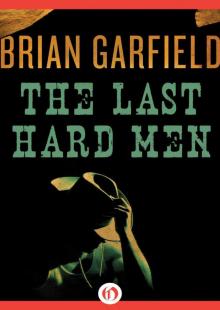 The Last Hard Men
The Last Hard Men Hit and The Marksman
Hit and The Marksman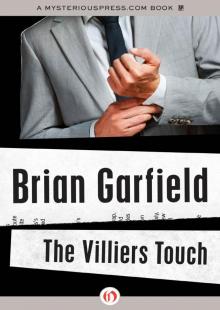 Villiers Touch
Villiers Touch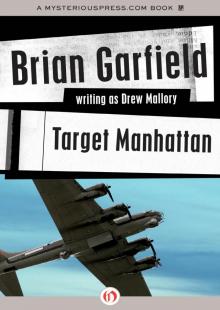 Target Manhattan
Target Manhattan Marchand Woman
Marchand Woman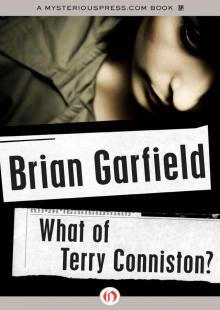 What of Terry Conniston?
What of Terry Conniston?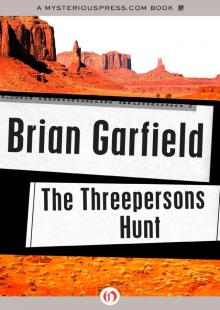 Threepersons Hunt
Threepersons Hunt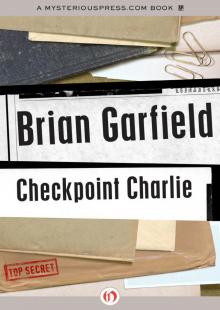 Checkpoint Charlie
Checkpoint Charlie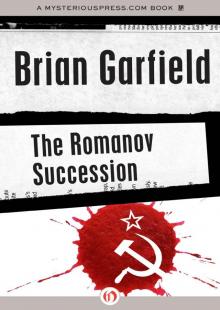 Romanov Succession
Romanov Succession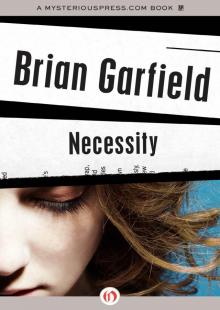 Necessity
Necessity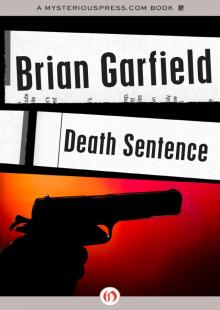 Death Sentence
Death Sentence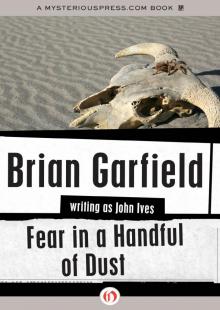 Fear in a Handful of Dust
Fear in a Handful of Dust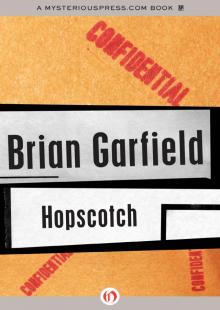 Hopscotch
Hopscotch